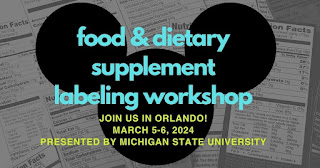When you think about the foods that make it to your table—from fresh produce to international imports—it’s easy to forget the complicated network of rules and regulations that make sure those products are safe, properly labeled, and fairly traded. Behind every label, inspection, and compliance form is a system of food laws that touches nearly every aspect of our lives. Understanding those laws isn’t just for lawyers; it’s essential for professionals across the food industry, policymakers, and even international organizations.
That’s where the Institute for Food Laws and Regulations (IFLR) at Michigan State University comes in. For more than two decades, IFLR has been helping people around the world understand and navigate the complexities of food regulation. What makes IFLR stand out is its singular focus: we don’t do research—we focus 100% on education. That means every course, every program, and every innovation is designed with one goal in mind: providing the best possible learning experience in food law.
A Global Classroom
One of the hallmarks of IFLR is its international reach. Our students come from across the globe, creating a truly diverse and dynamic learning community. In any given class, you might find a government regulator from Africa, a food safety officer from Asia, and an attorney working on trade issues in Europe—all learning alongside one another. This global mix of perspectives doesn’t just enrich the classroom; it also reflects the reality of food regulation, which increasingly crosses borders and requires international cooperation.
Expert Faculty, Real-World Experience
Our courses are led by faculty who are not only experts in food law but also have hands-on experience in industry, government, and international organizations. They bring real-world cases, challenges, and solutions directly into the classroom, making the learning both practical and engaging.
Accessible and Flexible Learning
Because all of our courses are offered online, students can fit their studies around busy professional and personal lives. Whether you’re a food industry executive looking to understand trade regulations, a policymaker navigating labeling requirements, or a student preparing for a career in food law, IFLR’s flexible programs are built to meet you where you are.
Looking Ahead
The world of food law is constantly evolving, from new technologies like cell-based meats to shifting international trade agreements. IFLR is committed to staying at the forefront of these developments, expanding our course offerings, and leveraging the latest in online learning technology to keep education accessible, engaging, and relevant.
At Michigan State University, we believe that education has the power to transform industries and improve lives. Through IFLR, we’re proud to empower professionals and students across the globe to navigate food laws with confidence, shaping safer, fairer, and more transparent food systems for everyone.



.jpg)





